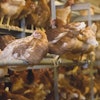
More than 2,000 protesters turned out on April 11 to support egg farmers in the north of Israel whose businesses are threatened by cheap egg imports, reports Jerusalem Post.
In the coming months, it is feared that the market will be flooded with cheaper eggs from other countries as a result of recent economic reforms by the government that have lowered the tariffs on a number of imported foods, including eggs.
At one protest near the border with Lebanon, Israel Farmers Federation secretary, Meir Tzur, said they were fighting for the homes and livelihoods of around 2,800 poultry farmers.
Yesh Atid MK Haim Jelin, who heads the Knesset Agriculture Lobby, said Agriculture Minister Uri Ariel’s reforms are leading to the destruction of farming and settlements along the country’s northern border.
Jelin accused the minister of preferring “to serve as a settlement minister and give money to some dark, isolated hills” instead of supporting farmers from the North and fighting food reforms.
Government official tries to reassure protesters
According to those on the spot, the situation became heated when Yaron Mazuz, a deputy minister in the Prime Minister’s Office, took the stage and said the government has been doing everything the right way.
“We came to support you,” Mazuz said. “This decision did not come from the Likud. It came from the agriculture minister.”
He assured the protesters that the poultry sector will not suffer as a result of the reforms.
One egg farmer said the government is trying to throw them out of their homes. Another told the crowd farmers will not accept retail chains determining their profits.
According to Haaretz, turmoil in the global markets and the dismal economic data in Israel have prompted a number of interest groups to demand that the latest economic reforms are halted. In the agri-food sector, the reforms would have seen import tariffs reduced or even eliminated in favor of direct aid to farmers and growers.

















